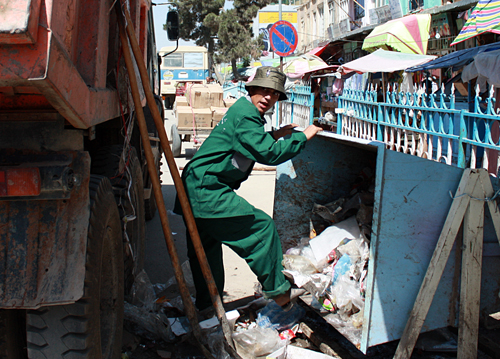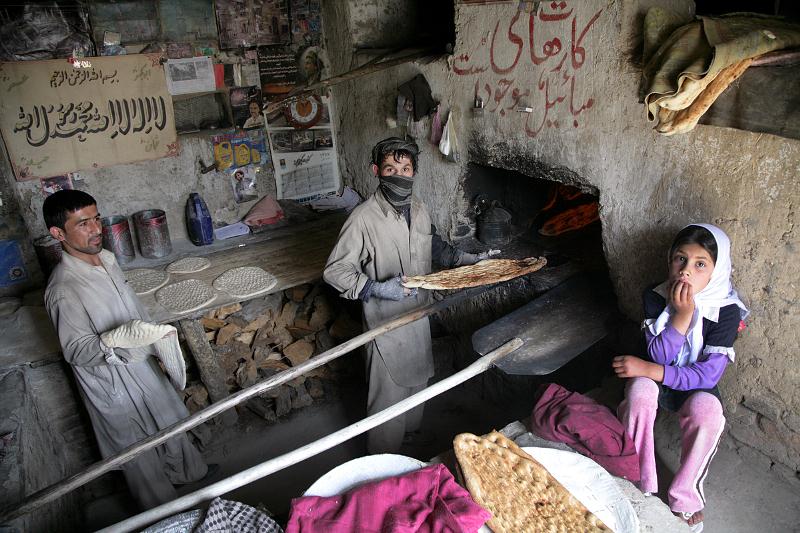KABUL - United Nations agencies in Afghanistan joined hands with local partners to mark World Environment Day today with workshops and awareness raising activities in line with theme of this year’s global day ‘Think.Eat.Save: Reduce Your Foodprint.’ Events focused on the need to reduce food waste.
“Hundreds of thousands of people are gearing up across Afghanistan to take part in World Environment Day, the biggest and most widely celebrated global day for positive environmental action,” said Andrew Scanlon, director of the United Nations Environment Programme (UNEP) in Afghanistan.
In the capital, Kabul, the UNEP, along with the UN Food and Agriculture Organization (FAO) and Government of Afghanistan, organized a seminar on “Waste Management: Sanitation, CO2 Reduction, Clean Development and Recycling in Afghanistan.” The awareness-enhancing workshop was attended by several hundred students. The UNEP in Afghanistan is holding another World Environment Day related event with President Hamid Karzai on 8 June.
Along the same theme of waste reduction, the FAO recently provided about 18,000 rural households with metallic silos to improve post-harvest storage. Farmers use the silos to store cereal grains and legumes, protecting them from the weather and pests, and last year post-harvest losses dropped from between 15 and 20 per cent to less than one or two per cent.
The Kabul event builds on in-country initiatives being carried out by UNEP and FAO. Recently, UNEP and the City of Kabul began a project at the city’s main dumping site that will gather, process and treat the methane gas emitted from decomposing garbage to produce electricity, heat and fuels for local use.
The World Environment Day was first marked in 1972 and has grown to become one of the main vehicles through which the UN stimulates worldwide awareness of the environment and encourages political attention and action.
According to FAO, a third of global food production – about 1.3 billion tons – is either wasted or lost, causing an enormous drain on natural resources and a contributor to negative environmental impacts. At the same time one in every seven people in the world go to bed hungry and more than 20,000 children under the age of five die each day due to hunger.
The causes of food losses and waste in low income countries like Afghanistan are mainly connected to financial, managerial and technical limitation in harvesting equipment, storage and cooling facilities.
“We must ensure access to adequate nutrition for all, double the productivity of smallholder farmers who grow the bulk of food in the developing world, and make food systems sustainable in the face of environmental and economic shocks,” Secretary-General Ban Ki-moon said in his message on the international Day.
In the last few years many Afghan policy makers have woken up to the environmental dangers of rapid urban and economic growth. Along with food waste, a growing problem is pollution.
According to Afghanistan’s National Environment Protection Agency (NEPA), a government body, pollution in Afghanistan and particularly in Kabul, where an estimated four million people live, has become a serious problem.
The deputy director of NEPA, Ghulam Mohammad Malikyar, said influx of people to city areas, habitat demands, increasing number of used and old cars, use of solid items, animal stools used for burning purposes and lack of fuel sources are the main factors damaging environment in Afghanistan.
“Afghanistan is a mountainous country and enjoys an opportunity to have a very good environment. But three decades of war and people’s crave for resources have hindered environment management efforts,” said Mr. Malikyar.
Citing an example of how the war impacted on environment, he said, “Before the civil war in the 1990s, forest constituted three per cent of Afghanistan’s land. But during the war half of the forests was destroyed either by mafia or by the people.”
He said some “important measures” have been initiated to revive forests and natural resources. For example, he said, his organization installed a pollution measuring device in Kabul which is able to provide hourly data about air pollution in the city. “Based on these data, we recommend the Kabul Municipality with required strategy so that they can take necessary measures to reduce risks from harmful particles in Kabul air,” Malikyar added.
Another NEPA official, Abdul Wali Mudaqiq, said awareness raising over the past years has stimulated environment-friendly policies. No major development project is undertaken without conducting environment impact assessment.
“Before 2011, Afghanistan was signatory to only one international environment convention, but today the country has the membership of ten international conventions and three international agreements on environment,” said Mr. Mudaqiq.
The Day was also celebrated throughout Afghanistan. In north-eastern Kunduz province, NEPA and the municipal government organized a city cleaning campaign. Hundreds of volunteers collected trash from city streets and delivered the refuse to the city dump.
In villages in the mountains outside central Bamyan province, UNEP offered government officials tours of its ecosystem-friendly disaster risk reduction projects, which aim to minimize the negative impacts of floods and avalanches.
As part of its celebrations, UNEP and the FAO will launch two new reports: one presenting a menu of solutions to reduce food waste and loss, and one highlighting how smallholder farmers have the potential to lift one billion people out of poverty given the right support and enabling conditions.






